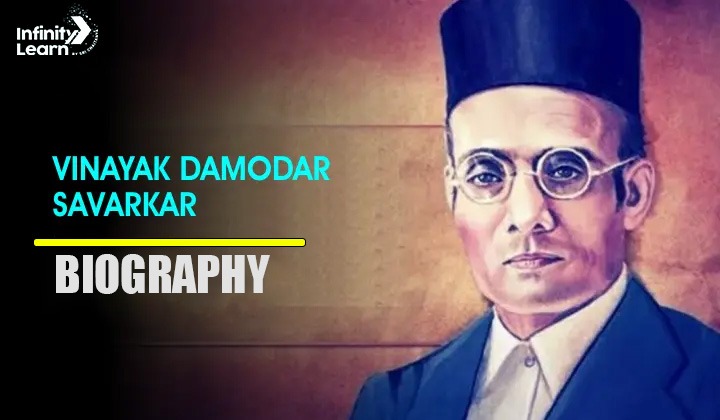Table of Contents
Vinayak Damodar Savarkar, also known as Veer Savarkar, was a prominent Indian freedom fighter, poet, writer, and politician. Born on May 28, 1883, in Bhagur, a small village near Nashik in Maharashtra, Savarkar was a key figure in the Indian independence movement, known for his revolutionary ideas and bold actions against British rule.

Vinayak Damodar Savarkar Biography – History
Savarkar’s journey into the annals of Indian history began with his early exposure to the nationalist movement. Influenced by the works of Lokmanya Tilak and other freedom fighters, Savarkar’s resolve to fight for India’s independence grew stronger.
He was deeply involved in revolutionary activities and was a founding member of the Abhinav Bharat Society, an organization dedicated to the cause of Indian independence. In 1909, his involvement in revolutionary activities led to his arrest by the British authorities. He was sentenced to life imprisonment and transported to the Cellular Jail in the Andaman and Nicobar Islands, where he endured immense hardships but continued his fight for freedom through his writings.
Also Check: List of Biographies
Vinayak Damodar Savarkar Biography- Education
Savarkar was an exceptionally bright student and pursued his education with great zeal. He completed his early schooling in Nashik and went on to study at Fergusson College in Pune. Later, he received a scholarship to study law at Gray’s Inn in London. It was during his time in London that Savarkar became more deeply involved in the Indian independence movement, joining revolutionary groups and advocating for India’s freedom from British rule.
Vinayak Damodar Savarkar Books
Savarkar was a prolific writer and poet. His writings include historical essays, plays, and poems that inspired many to join the freedom struggle. Some of his notable works include “The First War of Indian Independence,” where he presented the 1857 uprising as a unified struggle for freedom rather than a series of isolated events. His autobiography, “My Transportation for Life,” gives a detailed account of his experiences in the Cellular Jail. Other significant works include “Hindutva: Who is a Hindu?” which laid the foundation for the ideology of Hindutva, and “Six Glorious Epochs of Indian History,” which provides a historical analysis of India’s past.
Vinayak Damodar Savarkar Death
Vinayak Damodar Savarkar’s life was marked by his relentless pursuit of India’s independence and his efforts to revive Indian culture and nationalism. He passed away on February 26, 1966, in Mumbai. Savarkar’s legacy continues to influence Indian politics and society, and he is remembered as a fearless freedom fighter who dedicated his life to the cause of Indian independence.
In summary, Vinayak Damodar Savarkar’s contributions to India’s freedom struggle and his literary works have left an indelible mark on Indian history. His education, revolutionary activities, and writings continue to inspire generations of Indians to uphold the values of courage, patriotism, and dedication to the nation.
Vinayak Damodar Savarkar Biography In Hindi
विनायक दामोदर सावरकर, जिन्हें वीर सावरकर के नाम से भी जाना जाता है, भारत के प्रमुख स्वतंत्रता संग्राम सेनानी, कवि, लेखक और राजनीतिज्ञ थे। उनका जन्म 28 मई 1883 को महाराष्ट्र के नासिक जिले के भगूर गांव में हुआ था। सावरकर ने प्रारंभिक शिक्षा नासिक में पूरी की और फर्ग्यूसन कॉलेज, पुणे से स्नातक की पढ़ाई की। बाद में, वे कानून की पढ़ाई के लिए लंदन गए और ग्रेज़ इन से कानून की डिग्री प्राप्त की।
लंदन में अपने समय के दौरान, सावरकर भारतीय स्वतंत्रता आंदोलन में गहराई से शामिल हो गए। उन्होंने अभिनव भारत सोसाइटी की स्थापना की, जो भारत की स्वतंत्रता के लिए समर्पित एक क्रांतिकारी संगठन था। 1909 में, ब्रिटिश अधिकारियों ने उन्हें क्रांतिकारी गतिविधियों में शामिल होने के आरोप में गिरफ्तार कर लिया और उन्हें आजीवन कारावास की सजा सुनाई। सावरकर को अंडमान और निकोबार द्वीप समूह की सेल्युलर जेल में भेजा गया, जहां उन्होंने कठोर परिस्थितियों का सामना किया।
सावरकर ने कई महत्वपूर्ण किताबें लिखीं, जिनमें “1857 का प्रथम स्वतंत्रता संग्राम” और “हिंदुत्व: हु इज ए हिंदू?” शामिल हैं। उनके लेखन ने कई लोगों को स्वतंत्रता संग्राम में शामिल होने के लिए प्रेरित किया। सावरकर का निधन 26 फरवरी 1966 को मुंबई में हुआ। सावरकर की विरासत भारतीय राजनीति और समाज को प्रभावित करती है और उन्हें एक निडर स्वतंत्रता सेनानी के रूप में याद किया जाता है, जिन्होंने अपने जीवन को भारत की स्वतंत्रता के लिए समर्पित कर दिया।
Vinayak Damodar Savarkar Movie
The movie “Swatantrya Veer Savarkar” portrays the life and times of Vinayak Damodar Savarkar, a prominent Indian freedom fighter, poet, and writer. The film delves into his early influences, revolutionary activities, and enduring contributions to the Indian independence movement. It highlights his time in the Cellular Jail, his literary works, and his advocacy for Hindutva, capturing the essence of his unwavering dedication to India’s freedom.
Randeep Hooda delivers a compelling performance, bringing to life the complex character of Savarkar, showcasing his revolutionary spirit, intellectual depth, and profound patriotism. The film serves as a tribute to Savarkar’s legacy, inspiring audiences with his relentless pursuit of independence and his vision for a united and strong India.
FAQs on Vinayak Damodar Savarkar Biography
Why is Vinayak Damodar Savarkar famous in history?
Vinayak Damodar Savarkar is famous for his role as a freedom fighter, revolutionary, and writer who significantly contributed to India's independence movement and the ideology of Hindutva.
Did Savarkar meet Gandhi?
Yes, Vinayak Damodar Savarkar met Mahatma Gandhi in London in 1909, where they discussed their differing approaches to achieving Indian independence.
What happened with Savarkar?
Savarkar was arrested for his involvement in revolutionary activities, sentenced to life imprisonment, and transported to the Cellular Jail in the Andaman and Nicobar Islands, where he endured harsh conditions.
What is the religion of Vinayak Savarkar?
Vinayak Damodar Savarkar was a Hindu and a prominent advocate of Hindutva, emphasizing Hindu cultural and political identity.
Who is Guru of Savarkar?
One of Vinayak Damodar Savarkar's early influences and mentors was Bal Gangadhar Tilak, a prominent leader in the Indian independence movement.








